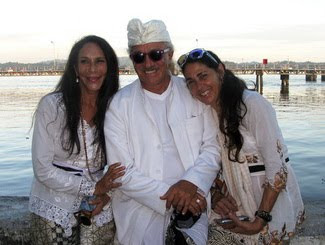Translated by Putu Semiada.

Children (Raré)
According to Miss No Kené No Keto (Miss Don’t Do This Don’t Do That), employing children as workers or labours is totally forbidden. “No way,” she says. Miss No Kené No Keto is a tourist who has been living in Bali for years.
She has been considered as Bulé Aga*, that is a westerner who thinks that he or she knows more about Bali than the Balinese do. Today, many tourists have become Bulé Aga. As they love Bali very much they think that they deserve to deal with all the problems in Bali, from protection of puppies, cats and other animals, to children protection in Bali.
“It is obviously indicated in the UN charters, ILO’s, Children Protection Convention, Indonesian 1945 Constitution, Pancasila (the Five Principles), the local regulations, traditional laws as well that employing children are against human rights,” she adds.
Nobody dares to argue with her, because (1) she provides them with rice wine (arak), peanuts, steamed pork (tum) and rental chairs for the children protection workshop, (2) Balinese don’t dare to argue with tourists. Balinese promote Cultural Tourism where tourists are king. Whatever the tourists say, the Balinese will nod. Whatever the tourists ask for, the Balinese will always try to provide them with, from ‘rice field’, ‘land’, mountain, to ‘lake’. When the tourists don’t ask for anything, the Balinese approach them, and offer something.
“So, you Balinese should stop asking your children to help you working or to be labourers. Let them enjoy their childhood, play and study with their friends,” says Miss No Kené No Keto.
Everyone nods. There has been no question. They give applause when the workshop finishes and compliment her accordingly. But once she’s gone, they talk to one another. That’s typical Balinese behaviour; they don’t dare to argue but prefer talking behind someone’s back instead. After that hatred usually spreads among them. Eventually, they will have a falling out, then finally find powerful healers and ask them to send black magic to hurt each other.
“Oh My God, if I ask my son to stop my other son I Putu Unyil (Tiny Putu) to help me look after my warung in the morning, who else will help then? You know, I’m always busy in the fields, my wife must feed the pigs, and our grandparents have been suffering rheumatic,” says I Made Lacur Babak Belur (I Made Poor and Down Trodden).
His friends just nod. In Bali, it is common that when one tells one’s friends about problems, they will just nod but do not give any solution, let alone help.
“I don’t think it will ruin his childhood: He still can play with his friends and he still can practice gamelan in the evening. He goes to school in the afternoon,” says I Made. He doesn’t like people accuse him of being a father who ruins his son’s childhood.
They nod again.
“I know I don’t pay him, but I don’t feel like employing him: He is my son, and I think it is still okay for me to ask him for help to look after the warung in the morning.”
Having heard this, everyone laughs.
“Don’t panic, Made, our culture is not the same as theirs. Nobody will accuse you of employing your children.
In our culture, we teach our children the values of hard-working so that they will not be ‘spoiled’ and can be ‘strong’ when they are grown up. The most important thing is that you send him to school and let him play with his friends,” saya I Pekak Pocol Ongol-Ongol (I Pekak Nod-off).
____________________________
Note from our editor: “I invented the term ‘Bule Aga” in 1985 to describe Diana Darling who was becoming extreme, fundamentally, in her Hindu-Balinese way of life.”


























